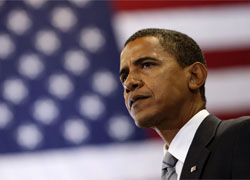Obama and Komarowski should mean business discussing Belarus
23- 26.05.2011, 8:48

The issues of democracy, human rights and international security will be in focus during the talks of the US and Polish presidents.
In an interview to INFO-TVP TV channel (Poland), Polish Foreign Minister Radoslaw Sikorski confirmed that Belarus will be in the spot of the negotiations.
The office of the Polish president does not have a clear plan of the talks so far, but does not exclude that the issue of Belarus will be discussed at the leaders’ meeting. A coordinator of the National Endowment for Democracy (NED) Rogozinska says that the positions of the US and Poland on Belarus are very close.
“It could be said rather confidently that the matter of democracy in Belarus is likely to be a topic of conversation between the US and Polish presidents, when Obama will visit Warsaw on Saturday. Poland promotes an idea to create a foundation to support democracy. It will be a priority during the chairmanship of Poland in the European Union, and these efforts are supported by the US definitely,” Radio Racyja was informed by Rogozinska.
A political analyst Raman Yakauleuski notes that Belarus will be discussed, but Belarus is not Barack Obama’s Administration’s priority in its foreign policy.
- When Obama’s coming to power, the role of the US in Eastern Europe has become weaker. They give prominence to central Asia and Caspian regions. In this case the US is trying to do something with Lukashenka in harmony with Moscow, and such facts occur. It is hard to say whether they are effective, Lukashenka stays in power now.
On May 27 Barack Obama to arrive to Poland on a two-week visit. On the agenda of the visit there is a meeting with Polish president and prime minister, and participation in the 17th summit of the heads of Central and Eastern European states.
A former Deputy Foreign Minister of Poland Witold Waszczykowski believes that the issue of relations with Belarus is complicated and needs to be heavily negotiated:
- The problem of security is rather important. We are witnessing uprisings against non-democratic governments in North Africa for a few months. So we should realize that sooner or later the situation could come to such an uprising against the undemocratic president and the undemocratic government. We, Poles, can have such a Gaddafi near our Eastern border. We should discuss with our allies how the neighbouring states, the US, the European Union and the NATO could act in such a situation. The problems with a non-democratic country, Belarus, at our Eastern border, are realistic.
Witold Waszczykowski also mentions other problems and issues which should be discussed in connection with the Belarusian topic.
“There are many issues: a territorial neighbourhood, close contacts between Polish and Belarusian organizations, and a great number of journalists who are working on the both sides of eh border, and other issues,” Radio Racyja was told by Waszczykowski.
A former Polish diplomat in Minsk Marek Bucko believes that Belarus is little known in the world, and primarily in Europe,
- This knowledge [about Belarus] would be useful both to US and European policy. As far as the US, information about Belarus is abundant, and as far as some of the European countries are concerned, its policy in the past was implemented highly unsuccessful. Primarily it was a result of insufficient amount of information, and due to the fact that no one in Europe wanted to listen to Poland’s voice. It is important for Poland to be eager to share this knowledge.
Dr Grzegorz Kostrzewa-Zorbas, a political analyst, believes that the previous policy of Europe and the US towards Belarus was ineffective and proved fruitless.
- It seems that the same well-known estimates would be repeated, and the aim would be to invent new programs of new actions, more productive ones, which would bring success without many years of waiting. This task is still open: those who would be able, would do that. Unfortunately, neither the US nor Poland, nor its present government; nor the previous republican government, nor the present Democratic administration, were able to solve this problem. Independent politicians, political analysts, public leaders make proposals, but the states usually do not listen to them.










